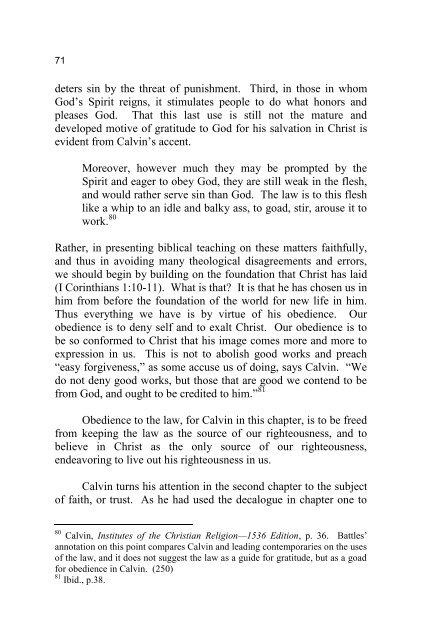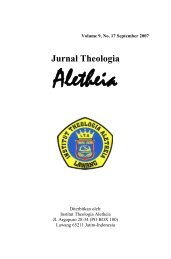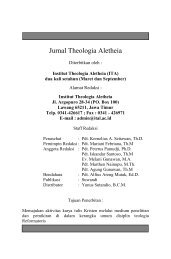download - Sekolah Tinggi Theologia Aletheia Lawang
download - Sekolah Tinggi Theologia Aletheia Lawang
download - Sekolah Tinggi Theologia Aletheia Lawang
You also want an ePaper? Increase the reach of your titles
YUMPU automatically turns print PDFs into web optimized ePapers that Google loves.
71<br />
deters sin by the threat of punishment. Third, in those in whom<br />
God‘s Spirit reigns, it stimulates people to do what honors and<br />
pleases God. That this last use is still not the mature and<br />
developed motive of gratitude to God for his salvation in Christ is<br />
evident from Calvin‘s accent.<br />
Moreover, however much they may be prompted by the<br />
Spirit and eager to obey God, they are still weak in the flesh,<br />
and would rather serve sin than God. The law is to this flesh<br />
like a whip to an idle and balky ass, to goad, stir, arouse it to<br />
work. 80<br />
Rather, in presenting biblical teaching on these matters faithfully,<br />
and thus in avoiding many theological disagreements and errors,<br />
we should begin by building on the foundation that Christ has laid<br />
(I Corinthians 1:10-11). What is that? It is that he has chosen us in<br />
him from before the foundation of the world for new life in him.<br />
Thus everything we have is by virtue of his obedience. Our<br />
obedience is to deny self and to exalt Christ. Our obedience is to<br />
be so conformed to Christ that his image comes more and more to<br />
expression in us. This is not to abolish good works and preach<br />
―easy forgiveness,‖ as some accuse us of doing, says Calvin. ―We<br />
do not deny good works, but those that are good we contend to be<br />
from God, and ought to be credited to him.‖ 81<br />
Obedience to the law, for Calvin in this chapter, is to be freed<br />
from keeping the law as the source of our righteousness, and to<br />
believe in Christ as the only source of our righteousness,<br />
endeavoring to live out his righteousness in us.<br />
Calvin turns his attention in the second chapter to the subject<br />
of faith, or trust. As he had used the decalogue in chapter one to<br />
80 Calvin, Institutes of the Christian Religion—1536 Edition, p. 36. Battles‘<br />
annotation on this point compares Calvin and leading contemporaries on the uses<br />
of the law, and it does not suggest the law as a guide for gratitude, but as a goad<br />
for obedience in Calvin. (250)<br />
81 Ibid., p.38.




